Political Science: Examining Standpoint Epistemology & Its Critics
VerifiedAdded on 2019/11/20
|7
|2097
|219
Essay
AI Summary
This essay critically examines standpoint epistemology, focusing on criticisms leveled against Patricia Hill Collins' work, particularly regarding objectivity and the use of lived experiences in academic discourse. The paper argues against these criticisms, defending Collins' position and highlighting how her work transcends the binaries often present in social science. The essay explores Collins' contributions to feminist standpoint theory, emphasizing her focus on the experiences of marginalized groups, especially black women, and her critique of dominant forms of social inquiry. It contends that Collins' approach offers a more comprehensive understanding of social reality and challenges the neutrality ideal in research, ultimately advocating for the value of diverse standpoints in generating social change and understanding power structures.

Political Science 1
Political science
Name
Course
Professor
School
City
Date
Political science
Name
Course
Professor
School
City
Date
Paraphrase This Document
Need a fresh take? Get an instant paraphrase of this document with our AI Paraphraser
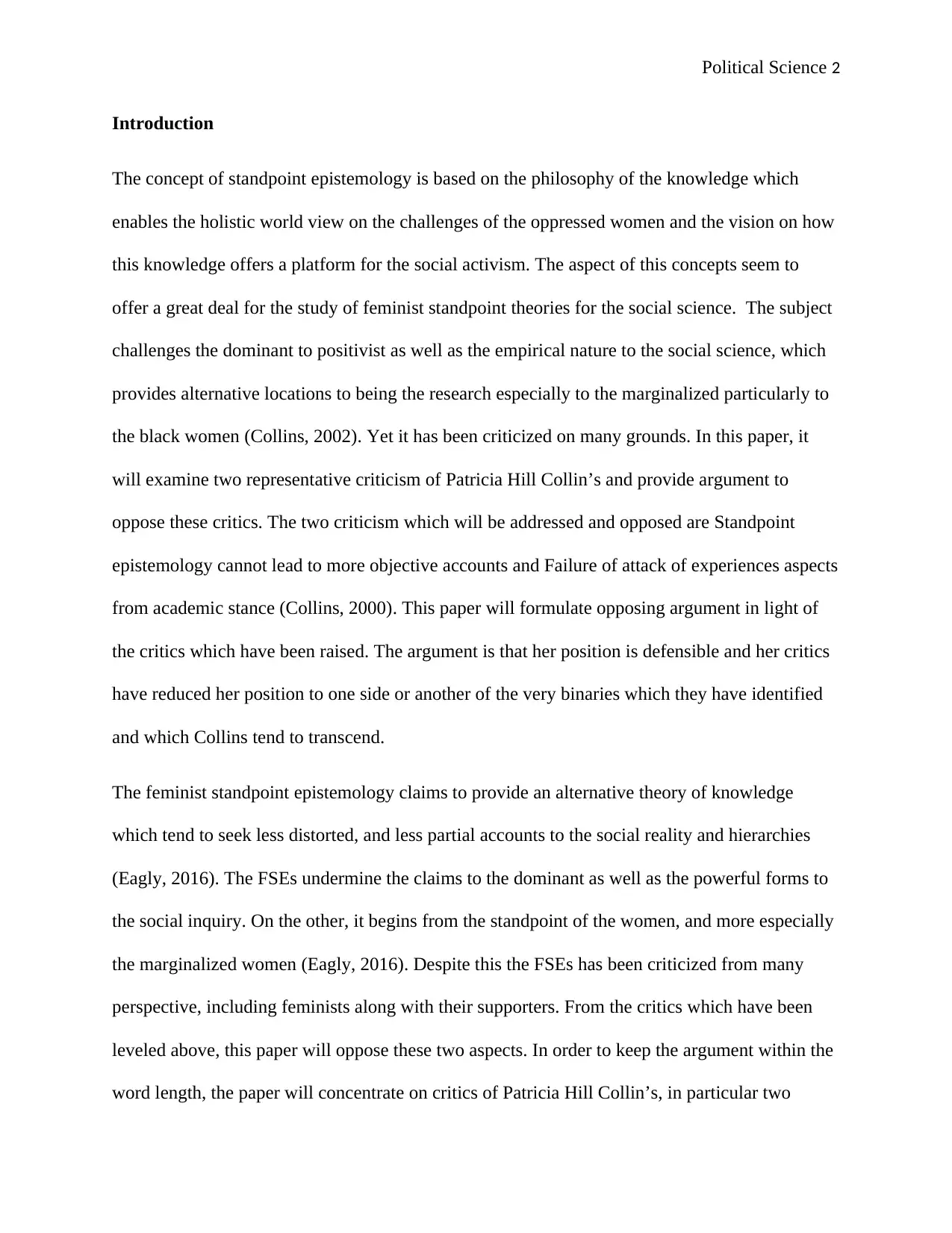
Political Science 2
Introduction
The concept of standpoint epistemology is based on the philosophy of the knowledge which
enables the holistic world view on the challenges of the oppressed women and the vision on how
this knowledge offers a platform for the social activism. The aspect of this concepts seem to
offer a great deal for the study of feminist standpoint theories for the social science. The subject
challenges the dominant to positivist as well as the empirical nature to the social science, which
provides alternative locations to being the research especially to the marginalized particularly to
the black women (Collins, 2002). Yet it has been criticized on many grounds. In this paper, it
will examine two representative criticism of Patricia Hill Collin’s and provide argument to
oppose these critics. The two criticism which will be addressed and opposed are Standpoint
epistemology cannot lead to more objective accounts and Failure of attack of experiences aspects
from academic stance (Collins, 2000). This paper will formulate opposing argument in light of
the critics which have been raised. The argument is that her position is defensible and her critics
have reduced her position to one side or another of the very binaries which they have identified
and which Collins tend to transcend.
The feminist standpoint epistemology claims to provide an alternative theory of knowledge
which tend to seek less distorted, and less partial accounts to the social reality and hierarchies
(Eagly, 2016). The FSEs undermine the claims to the dominant as well as the powerful forms to
the social inquiry. On the other, it begins from the standpoint of the women, and more especially
the marginalized women (Eagly, 2016). Despite this the FSEs has been criticized from many
perspective, including feminists along with their supporters. From the critics which have been
leveled above, this paper will oppose these two aspects. In order to keep the argument within the
word length, the paper will concentrate on critics of Patricia Hill Collin’s, in particular two
Introduction
The concept of standpoint epistemology is based on the philosophy of the knowledge which
enables the holistic world view on the challenges of the oppressed women and the vision on how
this knowledge offers a platform for the social activism. The aspect of this concepts seem to
offer a great deal for the study of feminist standpoint theories for the social science. The subject
challenges the dominant to positivist as well as the empirical nature to the social science, which
provides alternative locations to being the research especially to the marginalized particularly to
the black women (Collins, 2002). Yet it has been criticized on many grounds. In this paper, it
will examine two representative criticism of Patricia Hill Collin’s and provide argument to
oppose these critics. The two criticism which will be addressed and opposed are Standpoint
epistemology cannot lead to more objective accounts and Failure of attack of experiences aspects
from academic stance (Collins, 2000). This paper will formulate opposing argument in light of
the critics which have been raised. The argument is that her position is defensible and her critics
have reduced her position to one side or another of the very binaries which they have identified
and which Collins tend to transcend.
The feminist standpoint epistemology claims to provide an alternative theory of knowledge
which tend to seek less distorted, and less partial accounts to the social reality and hierarchies
(Eagly, 2016). The FSEs undermine the claims to the dominant as well as the powerful forms to
the social inquiry. On the other, it begins from the standpoint of the women, and more especially
the marginalized women (Eagly, 2016). Despite this the FSEs has been criticized from many
perspective, including feminists along with their supporters. From the critics which have been
leveled above, this paper will oppose these two aspects. In order to keep the argument within the
word length, the paper will concentrate on critics of Patricia Hill Collin’s, in particular two
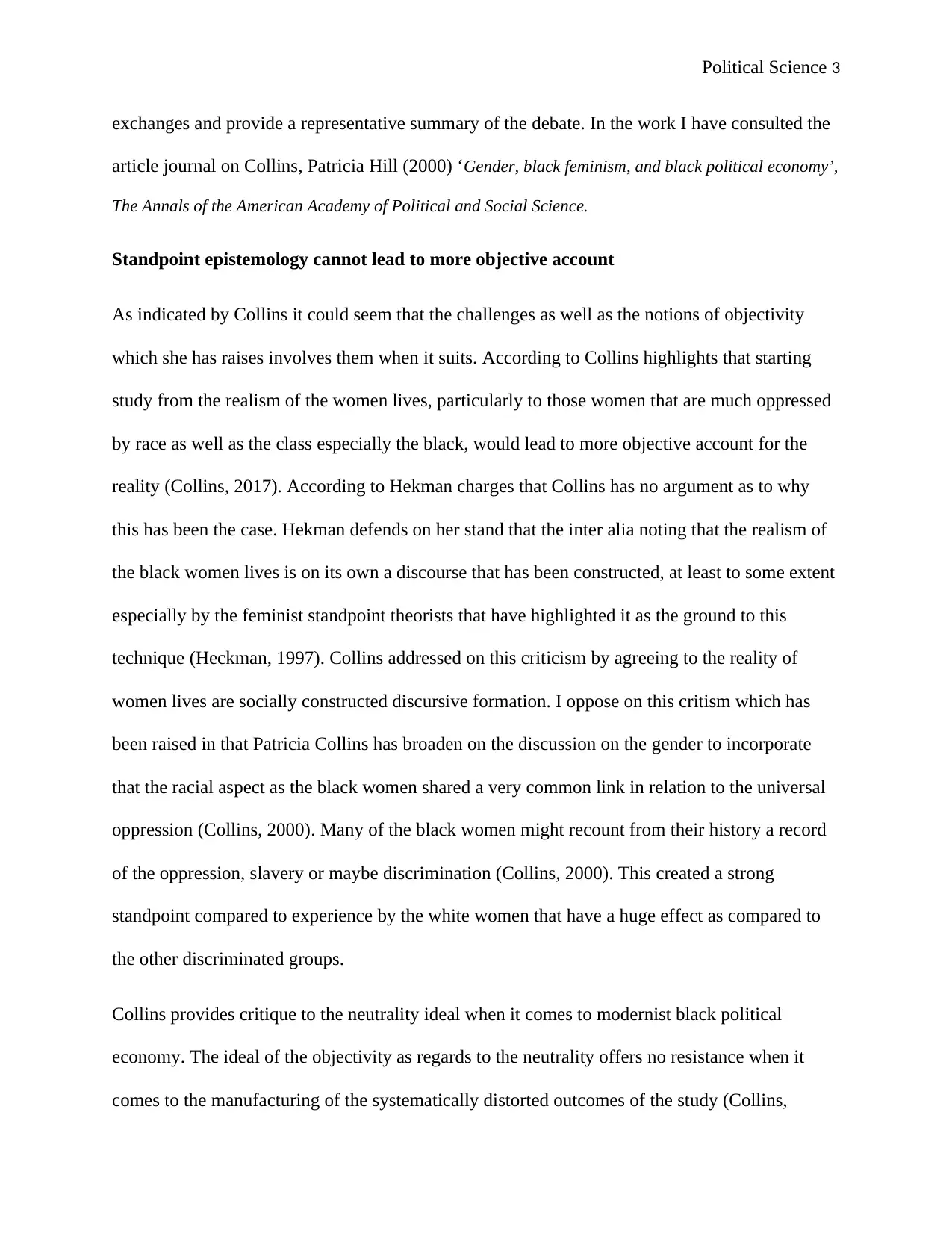
Political Science 3
exchanges and provide a representative summary of the debate. In the work I have consulted the
article journal on Collins, Patricia Hill (2000) ‘Gender, black feminism, and black political economy’,
The Annals of the American Academy of Political and Social Science.
Standpoint epistemology cannot lead to more objective account
As indicated by Collins it could seem that the challenges as well as the notions of objectivity
which she has raises involves them when it suits. According to Collins highlights that starting
study from the realism of the women lives, particularly to those women that are much oppressed
by race as well as the class especially the black, would lead to more objective account for the
reality (Collins, 2017). According to Hekman charges that Collins has no argument as to why
this has been the case. Hekman defends on her stand that the inter alia noting that the realism of
the black women lives is on its own a discourse that has been constructed, at least to some extent
especially by the feminist standpoint theorists that have highlighted it as the ground to this
technique (Heckman, 1997). Collins addressed on this criticism by agreeing to the reality of
women lives are socially constructed discursive formation. I oppose on this critism which has
been raised in that Patricia Collins has broaden on the discussion on the gender to incorporate
that the racial aspect as the black women shared a very common link in relation to the universal
oppression (Collins, 2000). Many of the black women might recount from their history a record
of the oppression, slavery or maybe discrimination (Collins, 2000). This created a strong
standpoint compared to experience by the white women that have a huge effect as compared to
the other discriminated groups.
Collins provides critique to the neutrality ideal when it comes to modernist black political
economy. The ideal of the objectivity as regards to the neutrality offers no resistance when it
comes to the manufacturing of the systematically distorted outcomes of the study (Collins,
exchanges and provide a representative summary of the debate. In the work I have consulted the
article journal on Collins, Patricia Hill (2000) ‘Gender, black feminism, and black political economy’,
The Annals of the American Academy of Political and Social Science.
Standpoint epistemology cannot lead to more objective account
As indicated by Collins it could seem that the challenges as well as the notions of objectivity
which she has raises involves them when it suits. According to Collins highlights that starting
study from the realism of the women lives, particularly to those women that are much oppressed
by race as well as the class especially the black, would lead to more objective account for the
reality (Collins, 2017). According to Hekman charges that Collins has no argument as to why
this has been the case. Hekman defends on her stand that the inter alia noting that the realism of
the black women lives is on its own a discourse that has been constructed, at least to some extent
especially by the feminist standpoint theorists that have highlighted it as the ground to this
technique (Heckman, 1997). Collins addressed on this criticism by agreeing to the reality of
women lives are socially constructed discursive formation. I oppose on this critism which has
been raised in that Patricia Collins has broaden on the discussion on the gender to incorporate
that the racial aspect as the black women shared a very common link in relation to the universal
oppression (Collins, 2000). Many of the black women might recount from their history a record
of the oppression, slavery or maybe discrimination (Collins, 2000). This created a strong
standpoint compared to experience by the white women that have a huge effect as compared to
the other discriminated groups.
Collins provides critique to the neutrality ideal when it comes to modernist black political
economy. The ideal of the objectivity as regards to the neutrality offers no resistance when it
comes to the manufacturing of the systematically distorted outcomes of the study (Collins,
⊘ This is a preview!⊘
Do you want full access?
Subscribe today to unlock all pages.

Trusted by 1+ million students worldwide
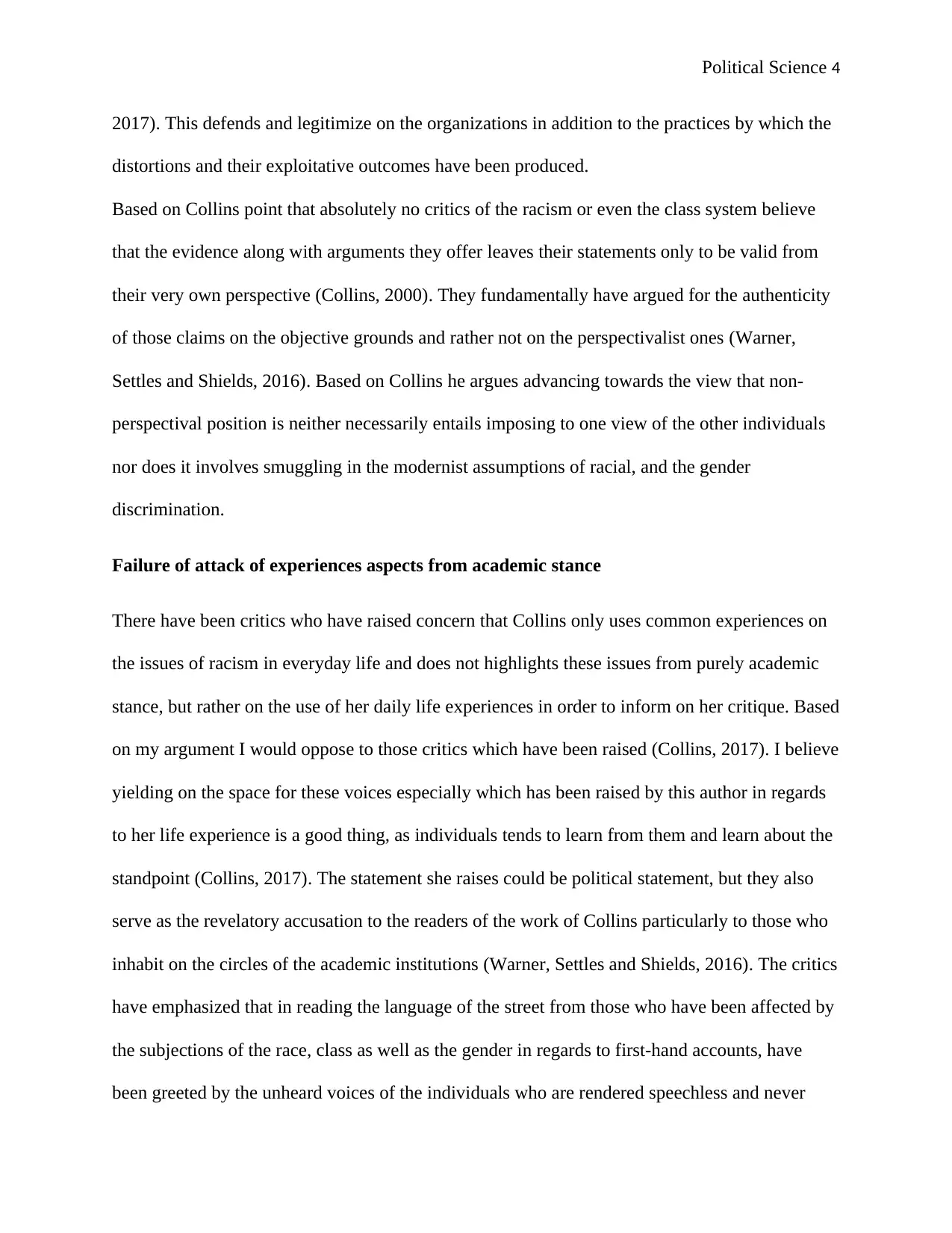
Political Science 4
2017). This defends and legitimize on the organizations in addition to the practices by which the
distortions and their exploitative outcomes have been produced.
Based on Collins point that absolutely no critics of the racism or even the class system believe
that the evidence along with arguments they offer leaves their statements only to be valid from
their very own perspective (Collins, 2000). They fundamentally have argued for the authenticity
of those claims on the objective grounds and rather not on the perspectivalist ones (Warner,
Settles and Shields, 2016). Based on Collins he argues advancing towards the view that non-
perspectival position is neither necessarily entails imposing to one view of the other individuals
nor does it involves smuggling in the modernist assumptions of racial, and the gender
discrimination.
Failure of attack of experiences aspects from academic stance
There have been critics who have raised concern that Collins only uses common experiences on
the issues of racism in everyday life and does not highlights these issues from purely academic
stance, but rather on the use of her daily life experiences in order to inform on her critique. Based
on my argument I would oppose to those critics which have been raised (Collins, 2017). I believe
yielding on the space for these voices especially which has been raised by this author in regards
to her life experience is a good thing, as individuals tends to learn from them and learn about the
standpoint (Collins, 2017). The statement she raises could be political statement, but they also
serve as the revelatory accusation to the readers of the work of Collins particularly to those who
inhabit on the circles of the academic institutions (Warner, Settles and Shields, 2016). The critics
have emphasized that in reading the language of the street from those who have been affected by
the subjections of the race, class as well as the gender in regards to first-hand accounts, have
been greeted by the unheard voices of the individuals who are rendered speechless and never
2017). This defends and legitimize on the organizations in addition to the practices by which the
distortions and their exploitative outcomes have been produced.
Based on Collins point that absolutely no critics of the racism or even the class system believe
that the evidence along with arguments they offer leaves their statements only to be valid from
their very own perspective (Collins, 2000). They fundamentally have argued for the authenticity
of those claims on the objective grounds and rather not on the perspectivalist ones (Warner,
Settles and Shields, 2016). Based on Collins he argues advancing towards the view that non-
perspectival position is neither necessarily entails imposing to one view of the other individuals
nor does it involves smuggling in the modernist assumptions of racial, and the gender
discrimination.
Failure of attack of experiences aspects from academic stance
There have been critics who have raised concern that Collins only uses common experiences on
the issues of racism in everyday life and does not highlights these issues from purely academic
stance, but rather on the use of her daily life experiences in order to inform on her critique. Based
on my argument I would oppose to those critics which have been raised (Collins, 2017). I believe
yielding on the space for these voices especially which has been raised by this author in regards
to her life experience is a good thing, as individuals tends to learn from them and learn about the
standpoint (Collins, 2017). The statement she raises could be political statement, but they also
serve as the revelatory accusation to the readers of the work of Collins particularly to those who
inhabit on the circles of the academic institutions (Warner, Settles and Shields, 2016). The critics
have emphasized that in reading the language of the street from those who have been affected by
the subjections of the race, class as well as the gender in regards to first-hand accounts, have
been greeted by the unheard voices of the individuals who are rendered speechless and never
Paraphrase This Document
Need a fresh take? Get an instant paraphrase of this document with our AI Paraphraser
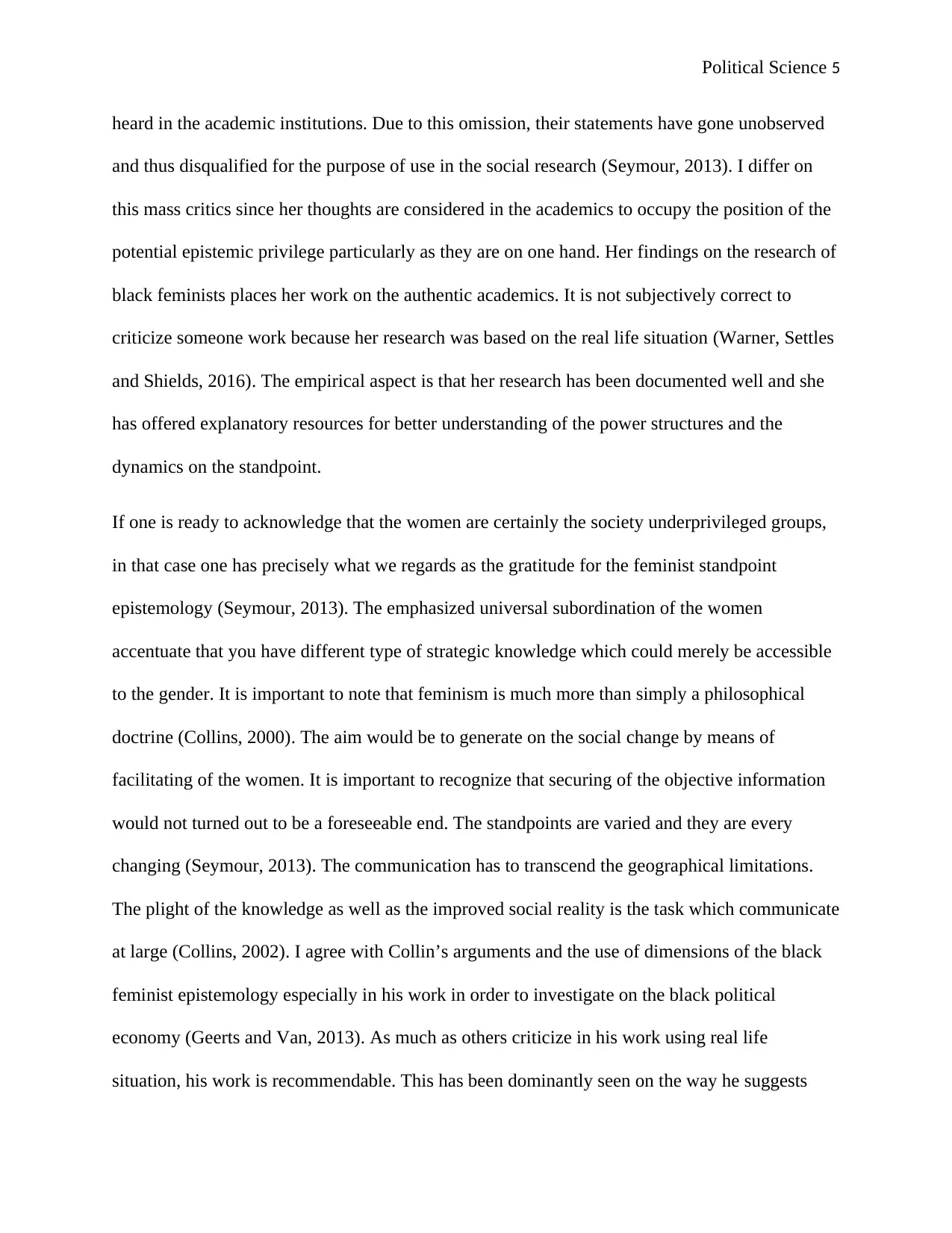
Political Science 5
heard in the academic institutions. Due to this omission, their statements have gone unobserved
and thus disqualified for the purpose of use in the social research (Seymour, 2013). I differ on
this mass critics since her thoughts are considered in the academics to occupy the position of the
potential epistemic privilege particularly as they are on one hand. Her findings on the research of
black feminists places her work on the authentic academics. It is not subjectively correct to
criticize someone work because her research was based on the real life situation (Warner, Settles
and Shields, 2016). The empirical aspect is that her research has been documented well and she
has offered explanatory resources for better understanding of the power structures and the
dynamics on the standpoint.
If one is ready to acknowledge that the women are certainly the society underprivileged groups,
in that case one has precisely what we regards as the gratitude for the feminist standpoint
epistemology (Seymour, 2013). The emphasized universal subordination of the women
accentuate that you have different type of strategic knowledge which could merely be accessible
to the gender. It is important to note that feminism is much more than simply a philosophical
doctrine (Collins, 2000). The aim would be to generate on the social change by means of
facilitating of the women. It is important to recognize that securing of the objective information
would not turned out to be a foreseeable end. The standpoints are varied and they are every
changing (Seymour, 2013). The communication has to transcend the geographical limitations.
The plight of the knowledge as well as the improved social reality is the task which communicate
at large (Collins, 2002). I agree with Collin’s arguments and the use of dimensions of the black
feminist epistemology especially in his work in order to investigate on the black political
economy (Geerts and Van, 2013). As much as others criticize in his work using real life
situation, his work is recommendable. This has been dominantly seen on the way he suggests
heard in the academic institutions. Due to this omission, their statements have gone unobserved
and thus disqualified for the purpose of use in the social research (Seymour, 2013). I differ on
this mass critics since her thoughts are considered in the academics to occupy the position of the
potential epistemic privilege particularly as they are on one hand. Her findings on the research of
black feminists places her work on the authentic academics. It is not subjectively correct to
criticize someone work because her research was based on the real life situation (Warner, Settles
and Shields, 2016). The empirical aspect is that her research has been documented well and she
has offered explanatory resources for better understanding of the power structures and the
dynamics on the standpoint.
If one is ready to acknowledge that the women are certainly the society underprivileged groups,
in that case one has precisely what we regards as the gratitude for the feminist standpoint
epistemology (Seymour, 2013). The emphasized universal subordination of the women
accentuate that you have different type of strategic knowledge which could merely be accessible
to the gender. It is important to note that feminism is much more than simply a philosophical
doctrine (Collins, 2000). The aim would be to generate on the social change by means of
facilitating of the women. It is important to recognize that securing of the objective information
would not turned out to be a foreseeable end. The standpoints are varied and they are every
changing (Seymour, 2013). The communication has to transcend the geographical limitations.
The plight of the knowledge as well as the improved social reality is the task which communicate
at large (Collins, 2002). I agree with Collin’s arguments and the use of dimensions of the black
feminist epistemology especially in his work in order to investigate on the black political
economy (Geerts and Van, 2013). As much as others criticize in his work using real life
situation, his work is recommendable. This has been dominantly seen on the way he suggests
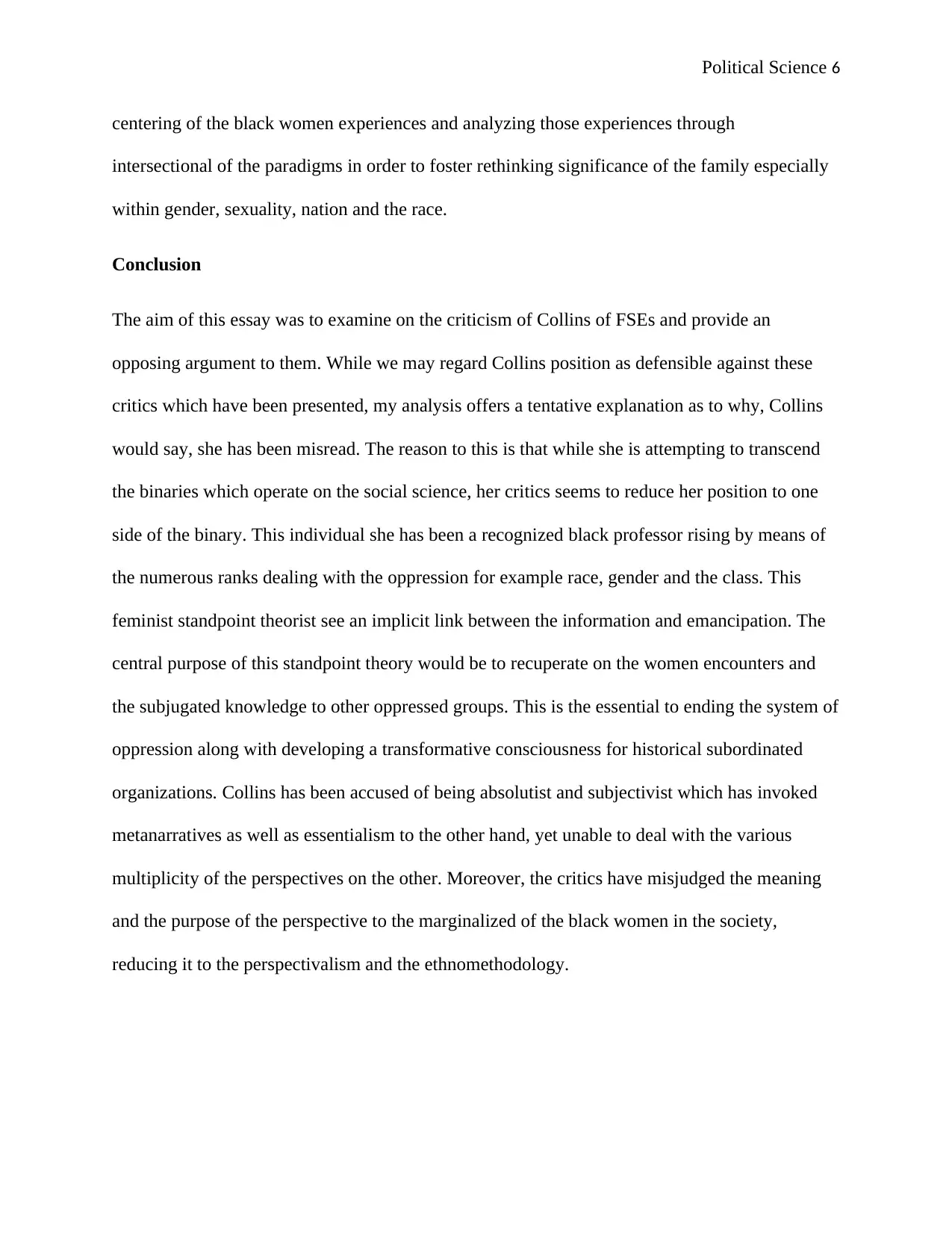
Political Science 6
centering of the black women experiences and analyzing those experiences through
intersectional of the paradigms in order to foster rethinking significance of the family especially
within gender, sexuality, nation and the race.
Conclusion
The aim of this essay was to examine on the criticism of Collins of FSEs and provide an
opposing argument to them. While we may regard Collins position as defensible against these
critics which have been presented, my analysis offers a tentative explanation as to why, Collins
would say, she has been misread. The reason to this is that while she is attempting to transcend
the binaries which operate on the social science, her critics seems to reduce her position to one
side of the binary. This individual she has been a recognized black professor rising by means of
the numerous ranks dealing with the oppression for example race, gender and the class. This
feminist standpoint theorist see an implicit link between the information and emancipation. The
central purpose of this standpoint theory would be to recuperate on the women encounters and
the subjugated knowledge to other oppressed groups. This is the essential to ending the system of
oppression along with developing a transformative consciousness for historical subordinated
organizations. Collins has been accused of being absolutist and subjectivist which has invoked
metanarratives as well as essentialism to the other hand, yet unable to deal with the various
multiplicity of the perspectives on the other. Moreover, the critics have misjudged the meaning
and the purpose of the perspective to the marginalized of the black women in the society,
reducing it to the perspectivalism and the ethnomethodology.
centering of the black women experiences and analyzing those experiences through
intersectional of the paradigms in order to foster rethinking significance of the family especially
within gender, sexuality, nation and the race.
Conclusion
The aim of this essay was to examine on the criticism of Collins of FSEs and provide an
opposing argument to them. While we may regard Collins position as defensible against these
critics which have been presented, my analysis offers a tentative explanation as to why, Collins
would say, she has been misread. The reason to this is that while she is attempting to transcend
the binaries which operate on the social science, her critics seems to reduce her position to one
side of the binary. This individual she has been a recognized black professor rising by means of
the numerous ranks dealing with the oppression for example race, gender and the class. This
feminist standpoint theorist see an implicit link between the information and emancipation. The
central purpose of this standpoint theory would be to recuperate on the women encounters and
the subjugated knowledge to other oppressed groups. This is the essential to ending the system of
oppression along with developing a transformative consciousness for historical subordinated
organizations. Collins has been accused of being absolutist and subjectivist which has invoked
metanarratives as well as essentialism to the other hand, yet unable to deal with the various
multiplicity of the perspectives on the other. Moreover, the critics have misjudged the meaning
and the purpose of the perspective to the marginalized of the black women in the society,
reducing it to the perspectivalism and the ethnomethodology.
⊘ This is a preview!⊘
Do you want full access?
Subscribe today to unlock all pages.

Trusted by 1+ million students worldwide
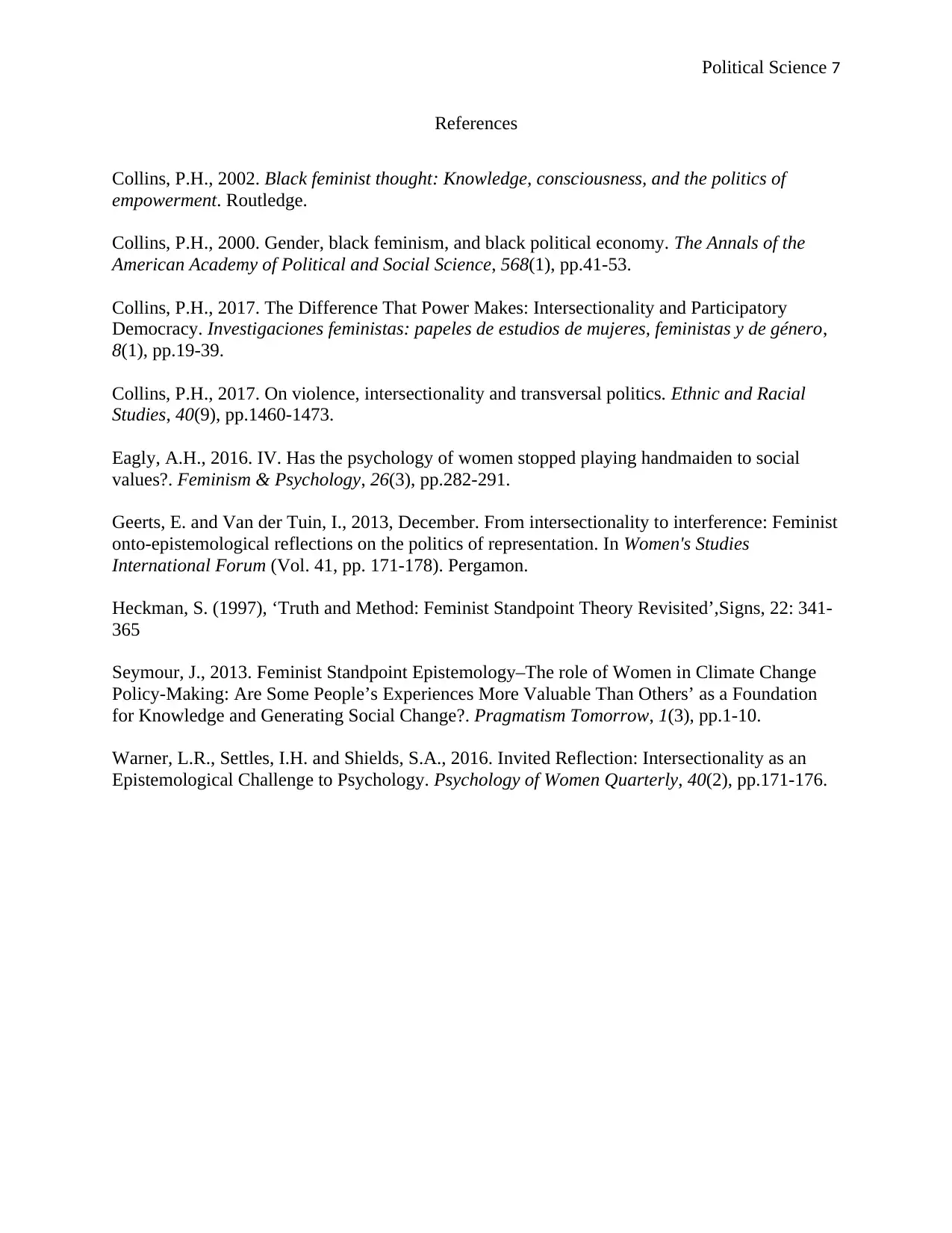
Political Science 7
References
Collins, P.H., 2002. Black feminist thought: Knowledge, consciousness, and the politics of
empowerment. Routledge.
Collins, P.H., 2000. Gender, black feminism, and black political economy. The Annals of the
American Academy of Political and Social Science, 568(1), pp.41-53.
Collins, P.H., 2017. The Difference That Power Makes: Intersectionality and Participatory
Democracy. Investigaciones feministas: papeles de estudios de mujeres, feministas y de género,
8(1), pp.19-39.
Collins, P.H., 2017. On violence, intersectionality and transversal politics. Ethnic and Racial
Studies, 40(9), pp.1460-1473.
Eagly, A.H., 2016. IV. Has the psychology of women stopped playing handmaiden to social
values?. Feminism & Psychology, 26(3), pp.282-291.
Geerts, E. and Van der Tuin, I., 2013, December. From intersectionality to interference: Feminist
onto-epistemological reflections on the politics of representation. In Women's Studies
International Forum (Vol. 41, pp. 171-178). Pergamon.
Heckman, S. (1997), ‘Truth and Method: Feminist Standpoint Theory Revisited’,Signs, 22: 341-
365
Seymour, J., 2013. Feminist Standpoint Epistemology–The role of Women in Climate Change
Policy-Making: Are Some People’s Experiences More Valuable Than Others’ as a Foundation
for Knowledge and Generating Social Change?. Pragmatism Tomorrow, 1(3), pp.1-10.
Warner, L.R., Settles, I.H. and Shields, S.A., 2016. Invited Reflection: Intersectionality as an
Epistemological Challenge to Psychology. Psychology of Women Quarterly, 40(2), pp.171-176.
References
Collins, P.H., 2002. Black feminist thought: Knowledge, consciousness, and the politics of
empowerment. Routledge.
Collins, P.H., 2000. Gender, black feminism, and black political economy. The Annals of the
American Academy of Political and Social Science, 568(1), pp.41-53.
Collins, P.H., 2017. The Difference That Power Makes: Intersectionality and Participatory
Democracy. Investigaciones feministas: papeles de estudios de mujeres, feministas y de género,
8(1), pp.19-39.
Collins, P.H., 2017. On violence, intersectionality and transversal politics. Ethnic and Racial
Studies, 40(9), pp.1460-1473.
Eagly, A.H., 2016. IV. Has the psychology of women stopped playing handmaiden to social
values?. Feminism & Psychology, 26(3), pp.282-291.
Geerts, E. and Van der Tuin, I., 2013, December. From intersectionality to interference: Feminist
onto-epistemological reflections on the politics of representation. In Women's Studies
International Forum (Vol. 41, pp. 171-178). Pergamon.
Heckman, S. (1997), ‘Truth and Method: Feminist Standpoint Theory Revisited’,Signs, 22: 341-
365
Seymour, J., 2013. Feminist Standpoint Epistemology–The role of Women in Climate Change
Policy-Making: Are Some People’s Experiences More Valuable Than Others’ as a Foundation
for Knowledge and Generating Social Change?. Pragmatism Tomorrow, 1(3), pp.1-10.
Warner, L.R., Settles, I.H. and Shields, S.A., 2016. Invited Reflection: Intersectionality as an
Epistemological Challenge to Psychology. Psychology of Women Quarterly, 40(2), pp.171-176.
1 out of 7
Your All-in-One AI-Powered Toolkit for Academic Success.
+13062052269
info@desklib.com
Available 24*7 on WhatsApp / Email
![[object Object]](/_next/static/media/star-bottom.7253800d.svg)
Unlock your academic potential
Copyright © 2020–2026 A2Z Services. All Rights Reserved. Developed and managed by ZUCOL.
